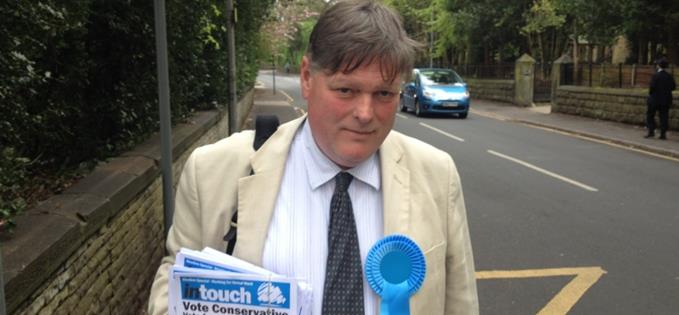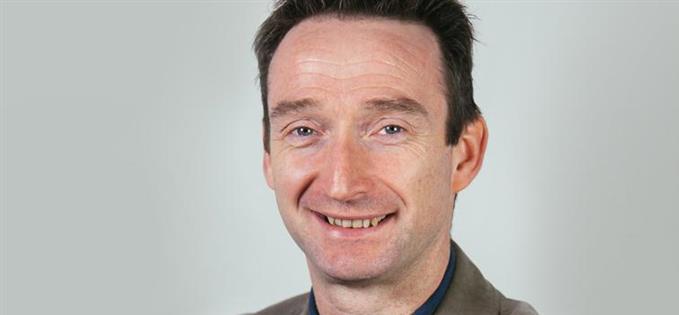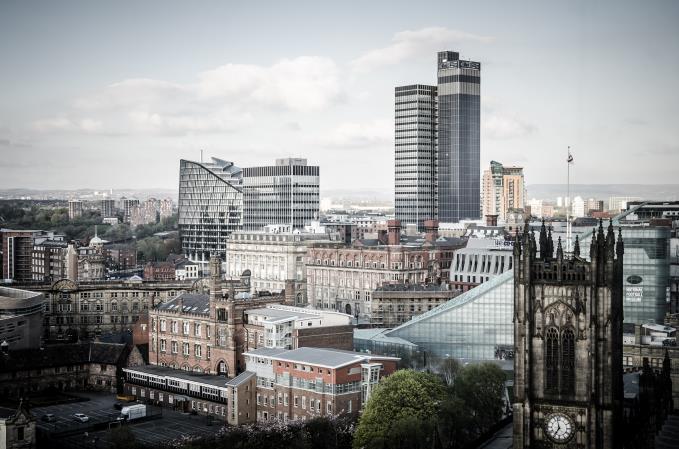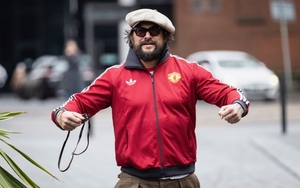CHAPTER ONE | Singing the Blues
Sir Richard Leese and Sir Howard Bernstein seem like they can get things done. So for David Cameron and George Osborne they seem like Tories.
“In Manchester is being a Conservative a love that dare not speak its name,” I ask.
“It is in certain areas,” says David Semple, Manchester Conservative Deputy Chairman and local candidate for Didsbury West. “I’ve seen this down in Didsbury, I’ve seen it all around the city, and it’s true we do have people who would vote Tory but it’s “Don’t tell my neighbours”. It’s a weird thing probably going back to Margaret Thatcher and how people perceived her in the North.”
Semple pauses and rearranges his dishevelled suit. A Canadian, he’s got a dishevelled charm too - even the way he calls Boris Johnson, Bo-Jo, makes you smile.
“It’s not just a dinner party thing either amongst the chattering classes,” he says. “I ran in Ancoats a couple of years ago. I didn’t get many votes but I spoke to hundreds of people. They seemed to like me but said “If you were Labour I’d vote for you”. We didn’t disagree on a lot of things but I have a feeling old class war type politics played their part.
“I still sense some of that,” he continues, “even with the people who weren’t born back then. There’s this hatred coming through. I get the feeling people think the Conservative Party is full of rich people trying to stuff our own pockets. I always say give us a voice in Manchester and we’ll take up issues for you, locally and nationally.”
Semple shifts on his seat, looks round the room and says: “We couldn’t be more different than the Eton stereotype. I’m an immigrant and we’ve got lots of immigrants working for us. Native English, no offence, don’t seem to want to join us in Manchester. We have Harry from Greece, he’s a waiter at the Victoria and Albert Hotel. We’ve got a Czech guy running in Moston, we’ve got a Romanian guy who’s a lecturer in robotics at Manchester University running in Higher Blackley.
“Our party here reflects what Manchester is, it has always been the immigrant city. Manchester was made up of immigrants from across the world, even Friedrich Engels, the friend of Marx and father of Communism and thus my nemesis - I hate Communism. Listen we know we have no chance in winning anything in Manchester at present but we have to contest every election. What I would like to do is build up a team of people across the city and Salford to be part of the community and represent the Conservatives. I think it’s a ten year task at least, then we'll be back. ”
“Do you find it odd, given the hopelessness of the position here,” I say, “that nationally the Conservative Party seems happy to work with Greater Manchester’s local Labour Party to deliver Devo-Manc? Isn’t that stabbing the local party in the back?”
“No,” says Semple, “handing back responsibility is a very Conservative thing. Why can’t Greater Mancunians be in charge of their own city region? As for us, I think George Osborne wants to rise above party politics. He’s a pragmatist, he sees Labour dominates the main city of the area. He sees this guy in charge of the council, Leese, sees he’s a very practical man, probably wants to be Mayor of Greater Manchester, nobody criticises him too much. With Sir Howard Bernstein he seems to get things done. So for David Cameron and George Osborne the pair seem like Tories. So they work a deal out, happens in politics all the time. We meanwhile work hard at grass roots level.”
 David Semple of the multi-cultural Conservatives
David Semple of the multi-cultural ConservativesCHAPTER TWO | Green Fury
AFTER I’ve stopped giggling about how Sir Richard Leese might feel about being called a Tory, I call the Green Party candidate for Manchester Central, Keiran Turner-Dave.
This man brings the clear-eyed absolutist energy of youth to the body politic. Issues are black and white for Turner-Dave, or rather, Green or wrong.
“DevoManc is a devolution of a budget crisis. It’s also undemocratic. We should have had a referendum over whether we want an Elected Mayor. We should have had a referendum over whether we accept the break-up of the NHS in Greater Manchester. We should have had a referendum over how we need local tax-raising powers and the freedom to build houses for our citizens. Locally Labour have really messed this up,” says Turner-Dave, drawing breath.
“This weak form of devolution is given us by a Tory (George Osborne, Chancellor of the Exchequer) with no mandate in Greater Manchester, a Council Leader (Sir Richard Leese) with 2,000 votes and an unelected chief executive (Sir Howard Bernstein). It’s a decision delivered by a handful of rich and powerful people, that won’t alter the fact we have the nation’s lowest life expectancy.”
I point out that for the architects of DevoManc that’s exactly what they want to change. I also point out that DevoManc involves ten councils working with national government and not just the City of Manchester. I point something else out too.
“You clearly don't like Labour yet it keeps getting into positions of power within Greater Manchester and keeps sending MPs to London from this region," I say. "They keep getting a mandate.”
“They’re doing nothing right in terms of what they used to stand for," says Turner-Dave. "They were a socialist party of the working class, now they back austerity and tax cuts. We would do the exact opposite. People keep voting Labour to keep the Tories out. We came second to Labour in last year’s local elections in Manchester. On the doorsteps we’re saying both in the national and local elections vote Green if you want a truly alternative voice. We’re the only party of the radical left now. Students and the young seem particularly responsive to us. They're think we're the party of hope.”
“It’s a shame then that your message isn’t getting through,” I say. “As your victory in Brighton proves you seem to still be a party of the cuddly middle-classes, of comfortably off people who like to wear their social consciences on their sleeve. You hardly seem the party of the struggling folk in the more deprived wards of Greater Manchester.”
Turner-Dave pauses over his response this time.
“As people get sick of a completely dominant Labour council in Manchester we think we’re seeing a change. As I said, we’re second at present in terms of this council vote. We think that we’ll consolidate that position and then - maybe not this time but we hope at the next election - we may get three or four councillors to challenge the austerity obsessed leadership in the city. If that begins with Hulme ward locally or Fallowfield then so be it.”
 Greens Manchester Central candidate Kieran Turner-Dave
Greens Manchester Central candidate Kieran Turner-DaveCHAPTER THREE | Golden afterglow from Coalition
JOHN Leech has been the sitting Liberal Democrat MP since 2005 for Manchester Withington. With a slender majority of 1,894 from the 2010 General Election - when the Liberal Democrats were riding a wave of Clegg-mania popularity - he’s now surely a dead man walking. The demolition of all Liberal Democrat city council opposition last year in the local elections proved support for the party had evaporated during its time as a Coalition party nationally.
“I’m confident in the Liberal Democrat message,” says Leech, in his typically abrasive and assertive manner. “I’m confident we’ll take sections of the city of Manchester back. 60% didn’t vote for Labour candidates. We will have councillors back in the Town Hall quickly. As for my position it’s also not clear cut. While people will vote with a view to national policies they’ll also vote according to the work their Member of Parliament has done. In Manchester Withington they’ll vote for me because it’s me. They’ll vote for my work on local issues, the work I did over the proposed closure of the walk-in centres. We believe we can hold this seat.”
“Nick Clegg believes his work in calming Tory excesses, will stand the party in good stead,” I say. “Do you think people can get over that U-turn on student fees for instance?”
“It’s happening,” says Leech. “Remember Nick Clegg comes across as the best leader of the three main parties - is the best leader. The best work in the Coalition has been down to our influence, look at the lifting of the tax threshold. We think the electorate are intelligent enough to see behind student fees to our achievement elsewhere.”
John Leech, almost sighs at this point. He says, “It’s just a shame that our influence in the Coalition government has stopped the Tories being incredibly unpopular. They’d have no chance if we hadn’t held them back.”
“And do the Liberal Democrats approve of the DevoManc plans – that coalition between the Conservatives, definitely not your party, and local Labour leaders?” I ask.
“Of course we support the principle of devolution,” says Leech. “We have been the party of de-centralisation for many years. Some elements of this package we’re not sure about, such as the need for an Elected Mayor. But as long as this isn’t a devolution of responsibility and an exercise in real decentralisation then the Liberal Democrats see this as a good opportunity for Greater Manchester.”
DevoManc aside, the Liberal Democrats and the Greens have common ground over one issue, proportional representation (PR). Last year one third of Manchester’s council wards, 32 out of the 96, were up for grabs.
“If PR existed then and given we attracted one in eight votes we’d have four people right now in the council chamber arguing for a different vision from this acquiescence of austerity,” says Turner-Dave of the Greens.
 Manchester Withington MP, John Leech
Manchester Withington MP, John LeechCHAPTER FOUR | Rainbow Conclusions
What is clear for all the three parties questioned (UKIP didn’t return my calls) is that Manchester’s Labour domination can be eroded. All agree that solid hard work in the wards and the constituencies is key but ideological arguments are important too.
David Semple, of the Conservatives, believes a Labour government under Ed Miliband would lurch so far to the left there’d be a blue-bounce back even in cities such as Manchester - being a Tory might be acceptable at dinner once again.
Keiran Turner-Dave believes that should Miliband become PM there won’t be enough of a left lurch. He thinks there’ll be a socialist backlash in the city - especially amongst the young.
John Leech thinks that the good sense of the Liberal Democrats, their local activism and their achievement in government (beyond tuition fees) will boost its stalled support.
Perhaps the best bet for all the opposition parties might be if the local Labour Party eats itself. Certainly in the City of Manchester a position of holding all 96 council wards seems unsustainable. History tells us politics factionalises in cases of one party domination. Already many commentators notice a high-handedness, a belief in what they do is incapable of criticism, amongst the Labour elite in the city. The inner circle might do well to remember that pride comes before a fall. The moment of crisis will come if there is no strong succession to Sir Richard Leese - the council leader for nineteen years.
But for now there remains no clear evidence that Labour as the majority party will suffer serious inroads into its power regionally. Council seats might be lost here and there, the odd MP too, but Greater Manchester, and especially the City of Manchester, looks set to remain deep, deep red.
You can follow Jonathan Schofield on Twitter here.
















